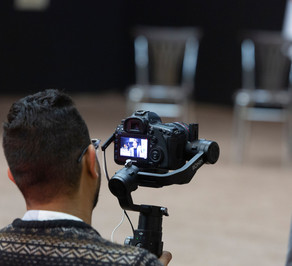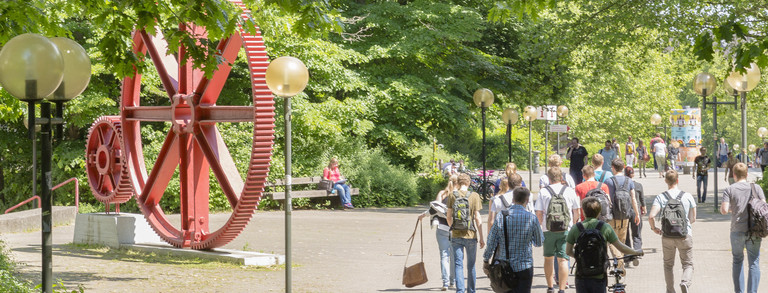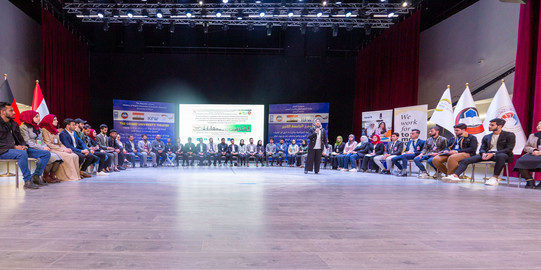
Home
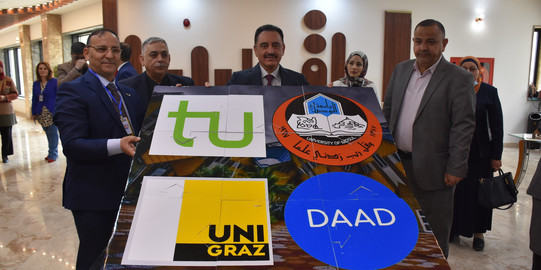
Conference concept
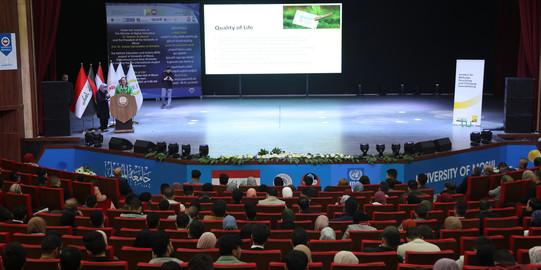
Opening
Workshops

Results
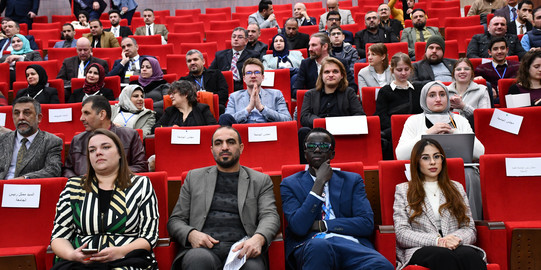
Picture Gallery

Closing

Materials
Conference
The student conference is a week-long extracurricular event designed for university students and academics to participate in interdisciplinary dialogue and exchange. The focus is on addressing challenges related to reconstruction and reconciliation in post-war Iraq. Participants will collaboratively review scientific findings and generate ideas on how young people, academia, and wider society in Nineveh and Iraq work together towards a common future. The theme for the conference is “Building Futures Together”. The special feature this year will be the realization of concrete projects which will focus on a sustainable future for all stakeholders. Scheduled for April 21 to 25, 2024, on the Mosul University campus, this conference marks the most impactful academic student event in the history of the University.
The conference holds significant importance for the organizers, marking a rejuvenation of the campus following the recent reconstruction of the student hall, library, and faculty buildings, along with a phase of pandemic-induced distance learning. As a central component of the conference, approximately 350 students across various academic disciplines will actively participate in around 12 interdisciplinary workshops meticulously curated by professors and lecturers from Iraq, Germany, and Austria. The outcomes of these workshops will be showcased and deliberated upon in terms of potential applications and policy implications during a culminating public conference event. The conference's framework has been meticulously crafted by a team of professors and has been successfully implemented in similar events between 2018 and 2023.
Conference theme 2024
The conference theme "Building Futures Together", encapsulates the urgent need for collective action and collaboration to address the pressing challenges facing our world today. It emphasizes the necessity of forging new partnerships that transcend traditional boundaries and unite diverse stakeholders in the pursuit of common goals. In an era defined by complex and interconnected issues, it is imperative that we cultivate fresh alliances/ partnerships. These partnerships should facilitate a deeper understanding of the multifaceted nature of these challenges and enable coordinated responses that draw upon the expertise and resources of various sectors.
Effective partnerships must transcend geographical, generational, and social divides. They should embrace a global perspective while also recognizing the importance of local context and engagement. Moreover, they should be inclusive, welcoming the participation of individuals from diverse backgrounds and perspectives, and actively work to overcome historical divisions and injustices.
The conference activities are designed to embody these principles. Participants will engage in collaborative sessions to review the latest scientific research and evidence related to the identified challenges. Through dialogue and exchange, they will deepen their understanding of the complexities involved and identify potential avenues for collective action. Building on the insights gained from scientific review, attendees will work together to generate innovative ideas and solutions aimed at addressing the identified challenges. These ideas will be grounded in the principles of inclusivity, sustainability, and equity, with a focus on harnessing the collective efforts of diverse stakeholders.
The outcomes of the collaborative sessions will be showcased in an exhibition format, allowing participants to share their ideas and insights with a wider audience. The exhibition will serve as a platform for dialogue and debate, facilitating interactions between researchers, practitioners, policymakers, and the general public.
The conference will culminate in a joint stakeholder dissemination workshop, where the results of the collaborative efforts will be presented and discussed. Key stakeholders, including university leadership, professionals, and policymakers, will come together to explore the implications of the findings for policy and practice. This event will serve as a catalyst for further action and collaboration, inspiring participants to continue working towards a better future for all.
Overall, the conference theme and activities embody a commitment to building inclusive, collaborative partnerships to create positive change. By working together, stakeholders can confront challenges and forge a more sustainable, equitable, and resilient future for generations to come.
Facilities
The student conference will be hosted at the Mosul University campus, with the opening and closing ceremonies held in a large theater hall. These events will be broadcasted live via streaming for broader accessibility.
Participants
A conference gathering 350 students spanning all academic disciplines at Mosul University, with a minimum of 20 percent representation from other universities, ensuring diversity and inclusion of minority groups.
The conference will gather over 350 students from various academic disciplines at Mosul University, with a minimum of 20 percent representation from other universities. This initiative aims to foster diversity and inclusion, ensuring the participation of minority groups.

